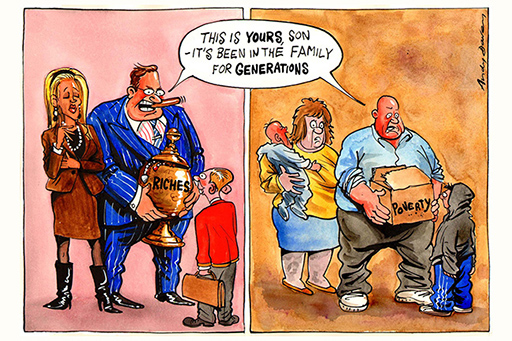6 Social mobility
Social mobility, or more accurately a lack of social mobility, is a key aspect of inequality.
In many countries, the reduction of economic and social inequality is ostensibly a major objective of public policy. The idea that people should succeed if they have the talent and opportunity to do so, is a key element to any consideration of the lottery of birth.
If a lack of social mobility is a problem, then it’s a problem for pretty much everyone, in developed and developing countries alike. With social mobility weakened by social inequalities, the poor are unlikely to be upwardly mobile and the wealthy are even less likely to be downwardly mobile (UN, 2013).
Political leaders, policy makers and commentators point to the thorny issue of stagnant social mobility and ask whether there are policies and practices that strengthen social mobility. Clearly, education systems lie at the heart of a low mobility culture. Educational inequalities mean poorer children’s education is more likely to be affected by less parental support and cognitive stimulation, they are likely to live in poorer neighbourhoods with less well-resourced schools and to have conflicting pressures such as domestic tasks and paid work (UN, 2013).
Belonging to a certain social group, gender, class, minority ethnic group or having a disability, for example, can also reduce the effectiveness of education to create social mobility (UN, 2013).
There is, of course, no agreement about the desirable levels of social mobility or even whether it’s necessary at all. If there is a lack of social mobility, should it be accepted as a natural process or should it be seen as the deliberate outcome of particular actions? Or is social mobility a reflection of a country’s values and a vital element within every modern state’s potential?
Next, you will be asked to think about how opportunities for social mobility might have changed.

